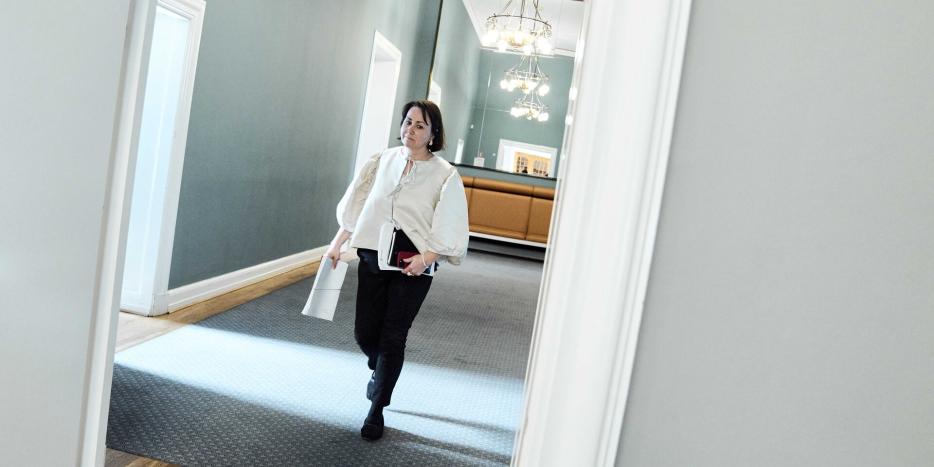Folketing politician Aaja Chemnitz (IA) wants the Minister of Social Affairs to take a position on cases of legal fatherlessness that risk becoming time-barred.
The case of the legally fatherless, who want compensation from the Danish state, grows larger as the years go by.
It has now been over three years since KNR was able to report that 26 legally fatherless children are collectively demanding 3,250,000 kroner in compensation from the Danish state for violations of human rights, as they believe that their right to family life has been violated. This happened back in June 2022.
In February 2023, the group, represented by Pramming Advokater, sued the Danish state after the Ministry of Social Affairs rejected the claim for compensation. The case will start in the Eastern High Court in November next year.
What does it mean to be legally fatherless?
- Until 1963 in West Greenland and 1974 in the rest of Greenland, there was no obligation of paternity for children born out of wedlock. This meant that the children had no right to know their father, inherit from him or take their father’s surname. They later became known as legally fatherless. At that time, Greenland was a Danish county and thus it was Danish legislation. A report from the Ministry of Children and Social Affairs from 2016 shows that the total number of legally fatherless in the period 1911 to 1974 was around 8,000 people. According to the same report, in 2016 there were almost 5,000 legally fatherless. In 2014, a legislative amendment was introduced that gave legally fatherless the opportunity to start paternity proceedings and inherit from the father if the estate has not been settled. In the 2019 Finance Act, 4.7 million kroner was allocated in 2019-2023 for efforts for legally fatherless people, which include an information campaign, treatment offers and legal advice. In February 2023, 26 legally fatherless people sued the Danish state. They are demanding a total of 3,250,000 kroner in compensation from the state. The Danish state has rejected the compensation claim, and the case will now go to court.
In the meantime, several more legally fatherless people have joined the case, who also want to be part of the case. Lawyer at Pramming Advokater, Amalie Holten, states that the lawyers are currently aware of around 60 people who want to be part of the lawsuit.
But the lawyers want to avoid the ministry invoking the statute of limitations in the new cases that are not part of the original lawsuit. The case could last for many years.
– So while the trial is now pending, we want to ensure that no one can make an argument that the other cases are now time-barred, says Amalie Holten.
The statute of limitations is three years. This means that you may lose the right to sue if too much time has passed since the claim arose.
Waste
Therefore, Aaja Chemnitz from Inuit Ataqatigiit, who sits in the Folketing, has now sent a Section 20 question to the Danish Minister of Social Affairs, Sophie Hæstorp Andersen, asking whether the minister will enter into a general suspension agreement.
This means that the statute of limitations will be suspended in all cases until the trial is resolved.
– It goes without saying that when it can take up to three years to process a case from the state, which is quite central to the relationship between Greenland and Denmark, it is a form of waste.
– And I won’t say exactly where the waste is happening, but I can just state that three years is far too long to get the clarification that is needed.
Aaja Chemnitz, why is it important for you as a politician to follow up on the case of legal fatherlessness, which is now becoming a court case?
Aaja Chemnitz, why is it important for you as a politician to follow up on the case of legal fatherlessness, which is now becoming a court case?
– That’s because it has scattered rings in the water. I also have people in my own family who are legally fatherless, and so it’s something that affects really, really many of us. It’s both those who are legally fatherless. It’s their entire families and descendants, and it has left some scars on people’s souls. That’s why it’s important that we take this seriously politically.
In addition to the case of the legally fatherless, 143 women from the spiral case sued the Danish state in March 2024. They are also waiting to have their case heard in court.
At the same time, four adoptees from Greenland are demanding a total of one million kroner in compensation from the Danish state for violating their human rights when they were removed from their families. A claim they sent on National Day on June 21st last year. Last week, the Ministry of Social Affairs rejected the claim for compensation.
